中考英语口语交际题
初三英语口语试题及答案
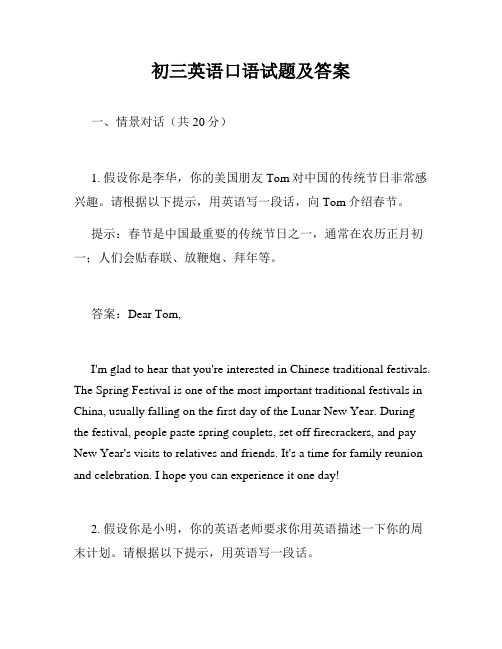
初三英语口语试题及答案一、情景对话(共20分)1. 假设你是李华,你的美国朋友Tom对中国的传统节日非常感兴趣。
请根据以下提示,用英语写一段话,向Tom介绍春节。
提示:春节是中国最重要的传统节日之一,通常在农历正月初一;人们会贴春联、放鞭炮、拜年等。
答案:Dear Tom,I'm glad to hear that you're interested in Chinese traditional festivals. The Spring Festival is one of the most important traditional festivals in China, usually falling on the first day of the Lunar New Year. During the festival, people paste spring couplets, set off firecrackers, and pay New Year's visits to relatives and friends. It's a time for family reunion and celebration. I hope you can experience it one day!2. 假设你是小明,你的英语老师要求你用英语描述一下你的周末计划。
请根据以下提示,用英语写一段话。
提示:周六上午去图书馆;下午去公园散步;周日上午去博物馆;下午去电影院看电影。
答案:Hello, Mrs. Smith,I'm planning to have a relaxing weekend. On Saturday morning, I'll go to the library to read some books. In the afternoon, I'll take a walk in the park to enjoy the sunshine. On Sunday morning, I'll visit the museum to learn more about history and culture. In the afternoon, I'll go to the cinema to watch a movie. I'm looking forward to a great weekend!二、看图说话(共20分)3. 观察下面的图片,描述一下图中的情景,并谈谈你对这种行为的看法。
中考英语口语交际单选题 30 题
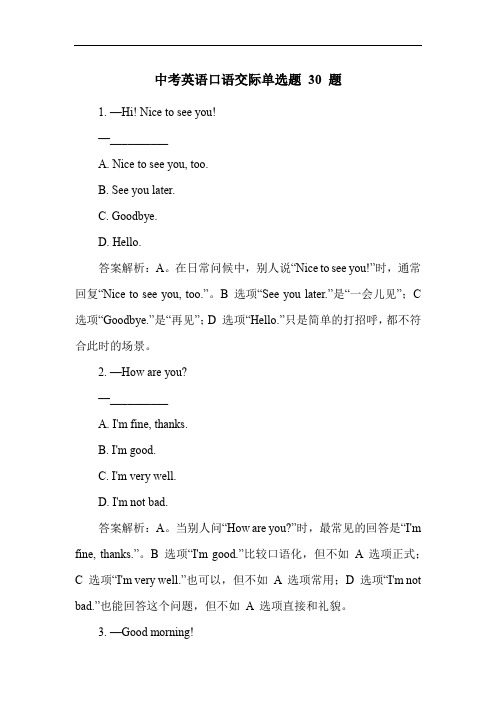
中考英语口语交际单选题30 题1. —Hi! Nice to see you!—__________A. Nice to see you, too.B. See you later.C. Goodbye.D. Hello.答案解析:A。
在日常问候中,别人说“Nice to see you!”时,通常回复“Nice to see you, too.”。
B 选项“See you later.”是“一会儿见”;C 选项“Goodbye.”是“再见”;D 选项“Hello.”只是简单的打招呼,都不符合此时的场景。
2. —How are you?—__________A. I'm fine, thanks.B. I'm good.C. I'm very well.D. I'm not bad.答案解析:A。
当别人问“How are you?”时,最常见的回答是“I'm fine, thanks.”。
B 选项“I'm good.”比较口语化,但不如A 选项正式;C 选项“I'm very well.”也可以,但不如A 选项常用;D 选项“I'm not bad.”也能回答这个问题,但不如A 选项直接和礼貌。
3. —Good morning!—__________A. Good morning!B. Good afternoon!C. Good evening!D. Hello!答案解析:A。
在早上别人说“Good morning!”时,应回复“Good morning!”。
B 选项是“下午好”;C 选项是“晚上好”;D 选项只是打招呼,不符合早上的场景。
4. —What's your name?—__________A. I'm Tom.B. My name is Tom.C. This is Tom.D. He is Tom.答案解析:B。
中考英语口语交际题汇总.doc
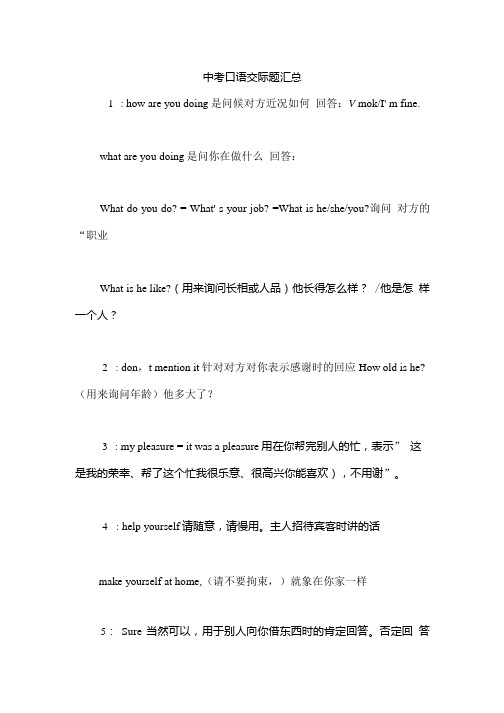
中考口语交际题汇总1: how are you doing是问候对方近况如何回答:V mok/I' m fine.what are you doing是问你在做什么回答:What do you do? = What' s your job? =What is he/she/you?询问对方的“职业What is he like?(用来询问长相或人品)他长得怎么样? /他是怎样一个人?2: don,t mention it针对对方对你表示感谢时的回应How old is he?(用来询问年龄)他多大了?3: my pleasure = it was a pleasure用在你帮完别人的忙,表示” 这是我的荣幸、帮了这个忙我很乐意、很高兴你能喜欢),不用谢”。
4: help yourself请随意,请慢用。
主人招待宾客时讲的话make yourself at home,(请不要拘束,)就象在你家一样5:Sure当然可以,用于别人向你借东西时的肯定回答。
否定回答是I' m afraid not.意为"恐怕不行”。
6: I am afraid so.意为“恐怕是这样的”,常用来表示一种不太肯定的语气。
7: No, thanks “不,谢谢!当对方问自己是否需要某物时可以说Yes, please.表示接受,也可说No, thank you.表示拒绝。
8: Never mind 不要紧”9: r d love to我很原意去。
用在别人邀请你时10: you mean it意思是"你是当真的?"11 sorry做错的事情首先应该说Sorry表示歉意,然后现表示不会再那样做了12:Thank you在英语中受到表扬或赞美时往往要欣然接受,向对方表示谢意13:在英语中听到对方诉说一些不幸的事情时往往要说“I' msorry to hear that. / Bad luck!”之类的话表示同情或安慰中考英语口语交际题汇总二例—:一You mean I have to go there by myself, for you are not free.—Yeah, you did it.你是说我必须自己去,因为你没空。
中考英语口语情景对话单选题60题
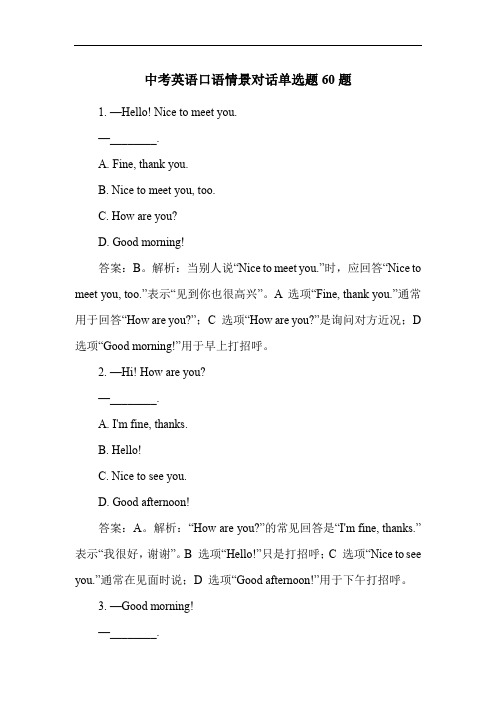
中考英语口语情景对话单选题60题1. —Hello! Nice to meet you.—________.A. Fine, thank you.B. Nice to meet you, too.C. How are you?D. Good morning!答案:B。
解析:当别人说“Nice to meet you.”时,应回答“Nice to meet you, too.”表示“见到你也很高兴”。
A 选项“Fine, thank you.”通常用于回答“How are you?”;C 选项“How are you?”是询问对方近况;D 选项“Good morning!”用于早上打招呼。
2. —Hi! How are you?—________.A. I'm fine, thanks.B. Hello!C. Nice to see you.D. Good afternoon!答案:A。
解析:“How are you?”的常见回答是“I'm fine, thanks.”表示“我很好,谢谢”。
B 选项“Hello!”只是打招呼;C 选项“Nice to see you.”通常在见面时说;D 选项“Good afternoon!”用于下午打招呼。
3. —Good morning!—________.B. Good afternoon!C. Good night!D. Good morning!答案:D。
解析:当别人说“Good morning!”时,应同样回复“Good morning!”表示早上好。
A 选项“Good evening!”用于晚上打招呼;B 选项“Good afternoon!”用于下午打招呼;C 选项“Good night!”用于晚上分别时说。
4. —Good afternoon!—________.A. Good morning!B. Good evening!C. Good night!D. Good afternoon!答案:D。
初三英语口语交际练习题及答案

初三英语口语交际练习题及答案练习一:问候与回应1. 你好吗?2. 早上好!3. 晚安!4. 你打算做什么?5. 你最近好吗?练习二:家庭与日常生活1. 你家有几口人?2. 你们通常在周末做什么?3. 你每天做家务吗?4. 你喜欢和家人一起吃饭吗?5. 你和家人关系好吗?练习三:学校与学习1. 你每天上学几点?2. 你最喜欢的课程是什么?3. 你平时怎么学习?4. 你通常在学校和同学们做什么?5. 你对自己的学习成绩满意吗?练习四:兴趣和爱好1. 你有什么特别的兴趣或爱好吗?2. 你喜欢看书吗?3. 你喜欢参加体育活动吗?4. 你喜欢听音乐吗?5. 你通常在空闲时间做什么?练习五:旅行与度假1. 你喜欢旅行吗?为什么?2. 你去过哪些地方旅行?3. 你最喜欢的旅行目的地是哪里?4. 你喜欢和家人还是朋友一起旅行?5. 你对将来的旅行计划有什么期待?练习六:人物与个人特征1. 描述一下你最好的朋友。
2. 你认为什么样的人最受欢迎?3. 你觉得你自己是一个有耐心的人吗?4. 你喜欢和外向的人交朋友还是内向的人交朋友?5. 描述一下你的梦想。
练习七:破冰与社交1. 你觉得自己容易与别人建立联系吗?2. 你在参加社交活动时会感到紧张吗?3. 你怎么与新认识的人交流?4. 你最喜欢的社交活动是什么?5. 你通常如何处理与他人发生争执的情况?练习八:购物与消费1. 你喜欢购物吗?在哪里购物比较方便?2. 你喜欢网购还是实体店购物?3. 你最近买了什么东西?4. 你通常在什么时候购物?5. 你对于节约金钱有什么经验分享吗?练习九:计划与未来1. 你有什么计划?2. 你的梦想是什么?3. 你将来想要从事什么职业?4. 你会选择在国外还是国内工作?5. 你对未来有什么期待?练习十:道歉与感谢1. 你对不起别人时会怎么做?2. 你认为基本道歉的方式是什么?3. 你感激别人的方式是什么?4. 你最近感谢过别人吗?5. 你觉得道歉和感谢在人际关系中有多重要?以上是初三英语口语交际练习题,通过这些问题的练习,可以帮助提高口语交际能力、拓宽思维视野、加深对英语文化的理解。
中考英语口语试题及答案
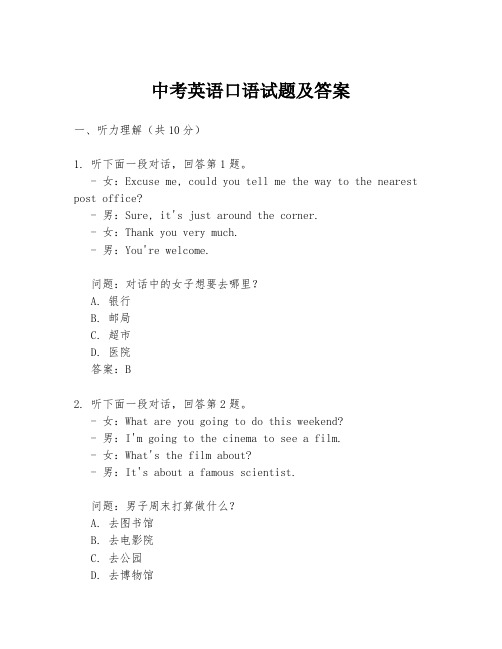
中考英语口语试题及答案一、听力理解(共10分)1. 听下面一段对话,回答第1题。
- 女:Excuse me, could you tell me the way to the nearest post office?- 男:Sure, it's just around the corner.- 女:Thank you very much.- 男:You're welcome.问题:对话中的女子想要去哪里?A. 银行B. 邮局C. 超市D. 医院答案:B2. 听下面一段对话,回答第2题。
- 女:What are you going to do this weekend?- 男:I'm going to the cinema to see a film.- 女:What's the film about?- 男:It's about a famous scientist.问题:男子周末打算做什么?A. 去图书馆B. 去电影院C. 去公园D. 去博物馆答案:B二、情景对话(共20分)3. 假设你是李华,你的朋友Tom邀请你参加他的生日派对。
请用英语写一封回信,表达你愿意参加,并询问派对的时间和地点。
答案示例:Dear Tom,Thank you for inviting me to your birthday party. I'd love to come. Could you please tell me the time and place of the party?Looking forward to your reply.Best,Li Hua4. 你和你的同伴正在讨论即将到来的英语演讲比赛。
请用英语表达你的观点。
答案示例:Well, I think participating in the English speech contest is a great opportunity to practice our speaking skills. It also helps us to improve our confidence and public speaking abilities.三、短文朗读(共20分)5. 请朗读以下短文,并注意语音、语调和节奏。
中考英语听力与口语交际单选题30题
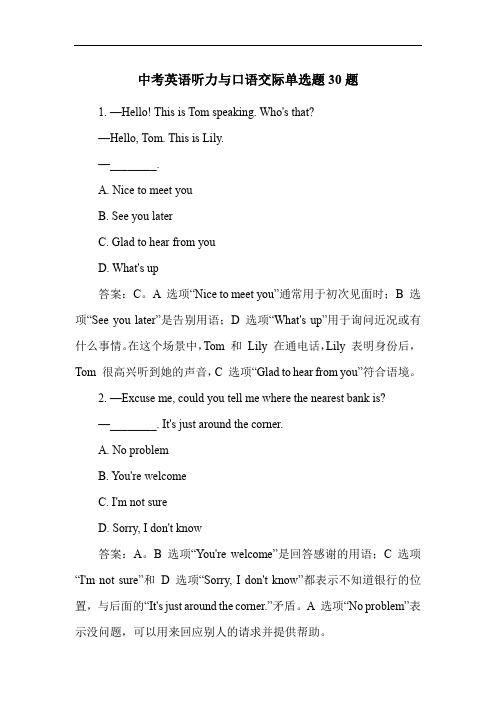
中考英语听力与口语交际单选题30题1. —Hello! This is Tom speaking. Who's that?—Hello, Tom. This is Lily.—________.A. Nice to meet youB. See you laterC. Glad to hear from youD. What's up答案:C。
A 选项“Nice to meet you”通常用于初次见面时;B 选项“See you later”是告别用语;D 选项“What's up”用于询问近况或有什么事情。
在这个场景中,Tom 和Lily 在通电话,Lily 表明身份后,Tom 很高兴听到她的声音,C 选项“Glad to hear from you”符合语境。
2. —Excuse me, could you tell me where the nearest bank is?—________. It's just around the corner.A. No problemB. You're welcomeC. I'm not sureD. Sorry, I don't know答案:A。
B 选项“You're welcome”是回答感谢的用语;C 选项“I'm not sure”和D 选项“Sorry, I don't know”都表示不知道银行的位置,与后面的“It's just around the corner.”矛盾。
A 选项“No problem”表示没问题,可以用来回应别人的请求并提供帮助。
3. —Would you like to go to the movies with me tonight?—________. I have a lot of homework to do.A. I'm sorry, I can'tB. That sounds greatC. Sure, I'd love toD. Of course not答案:A。
中考英语情景交际练习题20题含答案解析

中考英语情景交际练习题20题含答案解析1. —Hello! Nice to see you.—________.A. Hello! Nice to see you, too.B. Hello! Glad to see you.C. Hi! See you later.答案解析:A。
当别人说“Nice to see you.”时,通常回答“Nice to see you, too.”。
B 选项“Glad to see you.”虽然也表达高兴见到对方,但不是最标准的回复。
C 选项“See you later.”是告别用语,不符合此时语境。
2. —How are you?—________.A. I'm fine, thanks.B. I'm very good.C. I'm OK.答案解析:A。
“How are you?”的常见回答是“I'm fine, thanks.”。
B 选项“I'm very good.”在口语中不太常用作此问题的回复。
C 选项“I'm OK.”也比较常用,但没有A 选项正式。
3. —What's your name?—________.A. I'm Lily.B. My name is Lily.C. This is Lily.答案解析:B。
询问名字时,可以回答“My name is...”或者“I'm...”,A 选项“I'm Lily.”比较简洁,B 选项更完整。
C 选项“This is Lily.”一般用于介绍别人时使用。
4. —Thank you very much.—________.A. You're welcome.B. That's all right.C. Thanks.答案解析:A。
对于“Thank you very much.”的回复可以是“You're welcome.”“That's all right.”等,A 选项最常用。
- 1、下载文档前请自行甄别文档内容的完整性,平台不提供额外的编辑、内容补充、找答案等附加服务。
- 2、"仅部分预览"的文档,不可在线预览部分如存在完整性等问题,可反馈申请退款(可完整预览的文档不适用该条件!)。
- 3、如文档侵犯您的权益,请联系客服反馈,我们会尽快为您处理(人工客服工作时间:9:00-18:30)。
中考英语口语交际题
例一: You mean I have to go there by myself,for you are not free.Yeah, you did it. 你是说我必须自己去,因为你没空。
是的,你说的没错。
题Hi, Sunny. Your new flat is so
nice!Thanks, ______ .
例一:—You mean I have to go there by myself,
for you are not free.
—Yeah, you did it. 你是说我必须自己去,因为你没空。
是的,你说的没错。
题— Hi, Sunny. Your new flat is so nice! —Thanks, ______
.题-How are you doing, Daisy? -______ ,thank you!
题— Would you please lend me your bike? —
________.
题.—May I use your ruler? — __ __
1. —Don’t make any noise in the living room! My baby is sleeping.
—_______.
A. Sorry, I won’t
B. It doesn’t matter
C. Excuse me,
I’m wrong D. Certainly, I won’t
2. —I haven’t seen Jack for three days, is he ill?
—_______. His mother told me that he was in hospital.
A. I am afraid so
B. I hope not
C. I don’t expect
D. I
am afraid not
3. —Excuse me. May I use your computer?
—_______. It’s broken.
A. Sure
B. Yes, here you are
C. With pleasure
D. I’m afraid not
4. —Can I get you something to drink, Mr Smith?
—_______. I am thirsty.
A. Here you are
B. No, thank you
C. You’re welcome
D. Yes, please
5. —Your sweater is very beautiful, Joan!
—_______.
A. Thank you all the same
B. Not at all
C. Just so-so
D. Thank you
6. —What do you do? —_______.
A. I am thirteen
B. I work hard
C. I’m fine
D. I’m a student
7. —Andy isn’t going out this evening, is she?
—_______. She has to stay at home to look after her sick mother.
A. Yes, she is
B. No, she isn’t
C. Yes, she isn’t
D. No, she is
8. —Hello. May I speak to Mr. Wang?
—Who’s calling, please.
—_______.
A. I’m Mr. Wang
B. Mr. Wang is here
C. This is Mr. Wang speaking
D. Mr. Wang is calling
9. —I fell and hurt my leg just not.
—_______.
A. Be careful B It doesn’t matter C. I’m sorry to hear that D. Nothing serious
10. —_______.
—Thank you very much. I will.
A. Congratulations!
B. Best wishes to you
C. Please say hello to your family.
D. What a good wish to your family!
11- I had a really wonderful time in Harbin. It’s one of the most beautiful cities in China.
- ______.
A. It’s pleasure.
B. Good. Thank you
C. Enjoy yourself.
D. Oh, I’m glad to hear that.
12—I'll go fishing this weekend.
—
A. Can't you fish?
B. That's very kind of you.
C. What about more fish?
D. Have a good time.
13 —Hi, Bob. How's your family?
—
A. Fine, thank you
B. It's a big one
C. Not at all
D. They're having breakfast
14.—could I use your dictionary for a while?
--- .
A yes,please
B not at all
C it doesn’t matter Dit’s pleasure.
15 --- Would you mind my opening the window?
--- .It’s too cold outside.
A Yes,please
B No,please
C Yes, I would
D Of
course,you’d better not
16 ---Would you mind watering the flowers for me ?
--- ,I have to go to the post office.
A Not at all
B Never mind
C No,please
D sorry,I can’t.
9. ---How about going for a walk outside?
--- .
A Yes,I would
B No,I don’t like.
C Yes,I do C I’d like to。
